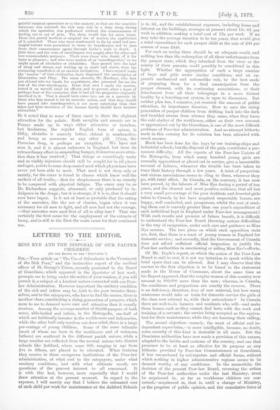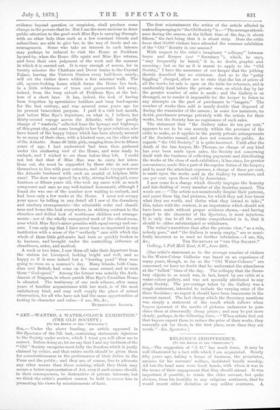LETTERS TO THE EDITOR.
MISS RYE AND THE DISPOSAL OF OUR PAUPER CHILDREN.
[TO TIM EDITOR OP TIIa " SPECTATOR.1 Sur,—Your article on " The Use of Stimulants in the Treatment of the Sick Poor," and the instructive report of the medical officer of St. George's Union, recently presented to the Board of Guardians, which appeared in the Spectator of last week, prompts me to bring under the notice of your readers, if you will permit it, a subject of a kindred nature connected. with our Poor- law Administration. However important the sanitary condition of the sick and infirm may be, both to the poor inmates them- selves, and to the ratepayers, who have to find the means, there is another class, constituting a rising generation of paupers, which seem to me to demand more care and attention than it usually receives. Among the average number of 80,000 paupers of both sexes, able-bodied and infirm, in the Metropolis, one-half of which are habitually inmates in the workhouses and infirmaries, while the other half only receives out-door relief, there is a large per-tentage of young children. Some of the more infantile (most of whom are born in the workhouse and of unknown fathers) are scattered in the different parish unions, while a large number are collected from the several unions into district schools like Ashford, where some 600, ranging in ago from five to fifteen, are placed to be educated. What training they receive in these overgrown institutions of the Poor-law administration, at what cost to the ratepayers, under what sanitary conditions, and with what ultimate result, are questions of the gravest interest to all concerned. It is with this last, however, more especially that I would draw attention at the present moment. In regard to the expense, I will merely say that I believe the estimated cost Of each child per week for maintenance at the Ashford Schools is 4s. 6d., and the establishment expenses, including loans and interest on the buildings, averages at present about 12s. 6d. per week in addition, making a total cost of 17s. per week. If we may take the average duration to be ten years, that would give a total expenditure for each pauper child at the rate of £44 per annum of some £440.
For such an outlay there should be an adequate result, and. nothing less than the redemption of all these unfortunates from the pauper state, which they inherited from the vices or the misery of their parents, could possibly be considered in this light. Whether the aggregation of such a large number of boys and girls under similar conditions, and an ex preasly mechanical and unhomelike rule, be the best mode of preparing them for a final emancipation from the pauper element, with its continuing associations, or their detachment from all their belongings iu a more distant locality by a boarding-out system, is open to discussion. But neither plan has, I conceive, yet received the amount of public attention, its importance deserves. How to save the rising generation of pauper children from drifting back into the dark and troubled stream from whence they came, when they leave the cold shelter of the workhouse, either on their own account or apprenticed out by the Guardians, is one of the most difficult problems of Poor-law administration. And no attempt hitherto made in this country for its solution has been attended with much success.
Much has been done for the boys by our training-ships and industrial schools, but the disposal of the girls constitutes a per- manent difficulty. All the reports of the Poor-law Unions of the Metropolis, from which many hundred young girls are annually apprenticed or placed out iu service, give a lamentable. account of failures, whenever the trouble has been taken to trace their history through a few years. A taint of pauperism and vicious associations seems to cling to them, wherever they go, with fatal effect. In Canada, on the contrary, it has now been proved, by the labours of Miss Rye during a period of ten. years, and the clearest and most positive evidence, that all but; a very small per-tentage of the poor destitute and deserted girls taken to Canada by her have acquired respectable homes, are happy, well conducted, and prosperous; whilst the cost of send- ing them out is scarcely greater than one year's expenditure of each individual kept in England under Poor-law management With such results and promise of future benefit, it is difficult to understand the Poor-law Board throwing serious difficulties. in the way of emigration, under such care and guidance as Miss. Rye secures. The two pleas on which such opposition rests are, first, that there is a want of young women in England for domestic service ; and secondly, that the Government of Canada does not afford sufficient official inspection to justify the• Poor-law authorities in sanctioning or aiding Miss Rye's efforts.
Of Mr. Doyle's report, on which the action of the Poor-Law Board is said to rest, it is not my intention to speak within the brief space that can be allowed. But I may observe that the answer to the first objection is to be found in the statement made in the House of Commons, about the same time as. his Report appeared, that the surplus women of this country now amount to 900,000 more than the men ; whereas, in Canada,. the conditions and proportions are exactly the reverse. There. is no deficiency, therefore, here of raw material, but how many mistresses would take or train for domestic service the girls of the class now referred to, with their antecedents P In Canada there are well-to-do farmers and residents who will—and make. them homes such as they cannot find here, with the work and training of a servant ; the service being accepted as the equiva- lent for their maintenance, while they are learning their calling.
The second objection—namely, the want of official and in- dependent supervision,—is more intelligible, because, uo doubt,. some security of this kind is desirable in all cases. But the Dominion authorities have now made a provision of this nature, adapted to the habits and customs of the country, and one that promises to be at least as effective for its purpOse as any hitherto provided by Poor-law Commissioners or Guardians, if less encumbered by red-tapeism and official forms, without which nothing in higher administrative regions seems to be deemed worthy of any confidence. In the meanwhile, the decision of the present Poor-law Board, reversing the action of the Poor-law authorities under the last Ministry, must be acquiesced in, so far as workhouse children are con, cerned,—acquiesced in, that is, until a change of Ministry, or the progress of public opinion, and the cumulative force of evidence beyond question or suspicion, shall produce some change in the powers that be. But I am the more anxious to draw public attention to the good work Miss Rye is carrying through, with no other help than such as a few constant friends and subscribers, are able to give her, in the way of funds and en- couragement. Some who take an interest in such labours may perhaps be induced to visit the Home at Peckham by-and-by, when the Home fills again and Miss Ryo returns, and form their own judgment of the work and the manner in which it is carried out. It is easy enough of access, for in twenty minutes the Chatham and Dover trains to the Crystal Palace, leaving the Victoria Station every half-hour, nearly, will set the visitor down within a five minutes' walk. The -old, square-looking house which forms the Home lies back, in. a little wilderness of trees and greensward, hid away, indeed, from the busy suburb of Peckham Rye, at the bot- tom of a short lane. It has, indeed, the look of having been forgotten by speculative builders and busy land-agents for the last century, and was secured some years ago for its present benevolent purpose. I paid it a visit last month, just before Miss Rye's departure, on what is, I believe, her thirty-second voyage across the Atlantic, with her goodly charge of " wastrels," collected from the byways and highways of this great city, and some brought to her by poor relatives, who have heard of the happy future which has been already secured to so many of their class, with a kindred race, on the other side of the Atlantic. Some 36 little girls, ranging from five to fifteen years of age, I had understood had been thus gathered under the sheltering roof of the Home, and were ready to embark, and I wished to see them before they left. I could not but feel that if Miss Rye was to carry her inten- tions out, she must be supported by those who do not care themselves to live with poor outcasts, and make voyages across the Atlantic burdened with such an armful of helpless little ones The door was opened by a tidy, strong-looking girl, some fourteen or fifteen years old, who took my name with as much -composure and ease as any well-trained housemaid, although I found she was one of the number now waiting to embark, and had been only a few weeks at the Home. I must not occupy your space by telling in any detail all I saw of the dormitory and sanitary arrangements—the admirable order and cleanli- ness and home-like look everywhere, in striking contrast to the cheerless and drilled look of workhouse children and arrange- ments—nor of the wholly unexpected work of the school-room, over which Miss Rye's sister presides with equal energy and suc- cess. I can only say that I have never been so impressed in any institution with a sense of the " motherly " care with which the whole of these little girl-arabs had been so quickly broken in to harness, and brought under the controlling influence of cleanliness, order, and method.
A week or two later, I saw them all take their departure from the station for Liverpool, looking bright and well, and as happy as if it were indeed but a "herring pond" they were going to cross on a summer's day. Many friends, both Cana- .dian and British, had come on the same errand, and to wish them " God-speed." Among the former was notably the Arch- deacon of Niagara, in whose parish Miss Rye's Canadian Home is situated. The testimony of one such witness, after many years of familiar acquaintance with her work, is of the most satisfactory kind, and may well supply the place of actual -observation, for all who have not had the same opportunities of testing its character and value.—i am, Sir, &c., RUTHERFORD ALCOCK.



































 Previous page
Previous page